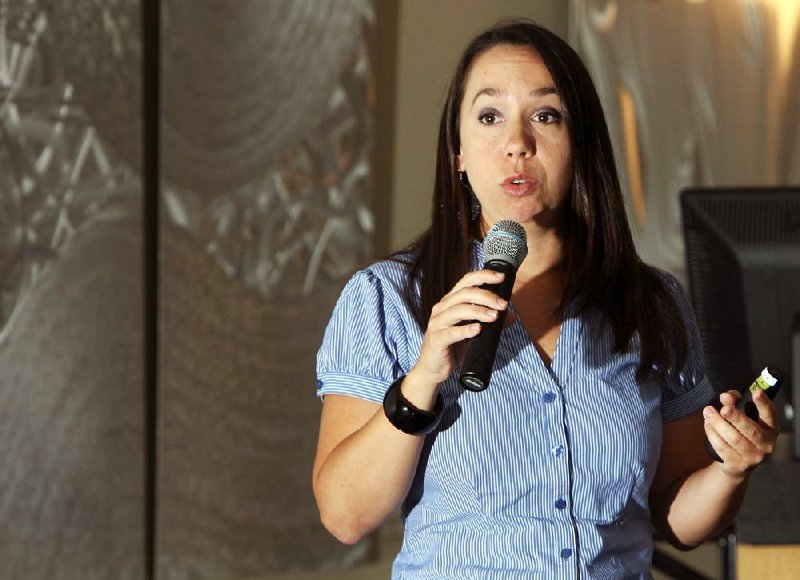When children ensnared in sex trafficking are discovered, they face two possible paths, a woman from a national nonprofit organization told an audience in Bentonville on Thursday.
If they are considered child prostitutes, some states treat them as criminals, and they are arrested, charged and prosecuted, said Elizabeth Scaife, director of training for Arlington, Va.-based Shared Hope International. If state laws treat them as victims of sex trafficking, theyare provided with an array of social services and their traffickers are prosecuted.
The label is important, Scaife said.
“It defines what happens to her,” Scaife said.
Scaife gave a presentation at Northwest Arkansas Community College on the research of Shared Hope International into child sex trafficking in the United States during the third and final day of what was billed as the state’s first legislative meeting on the subject. The conference ran in Little Rock for two days then concluded at the Bentonville college, which is home to the National Child Protection Training Center for 16 Southern states.
State Rep. Greg Leding, D-Fayetteville, said he hoped the three days of events brought more attention to the complex crime and the need for tougher state laws. He is interested in more severe penalties, both for traffickers and people paying for sex with children.
“The traffickers wouldn’t be able to make the money they do if people weren’t purchasing these girls,” Leding said. “The penalties aren’t high enough. Too many of the victims are charged with crimes. We need to do more to protect them and put them on a path toward rehabilitation.”
Shared Hope International analyzed human sex trafficking laws across the country and released report cards for each state in 2011. The report gave Arkansas an F for laws it said are insufficient to combat the commercial sexual exploitation of children.
While the state’s traffick-ing of persons law includes the crime of forced sexual conduct, the law requires proof from the victims under 18 of force, fraud or coercion, according to the report.
Arkansas should remove that requirement, Scaife said.
“We’re talking about traumatized children,” Scaife said.
Pimps employ force, fraud and coercion to exploit children, Scaife said. Force includes physical restraint, confinement in closets or trunks, and bodily harm. A human sex trafficking scheme pretending to employ beautiful girls as makeup models is an example of fraud. Human traffickers create a climate of fear, which falls under coercion, to keep victims from escaping, she said.
Legislators also should ensure that laws provide a clear path for human sex trafficking victims to receive social services and greater protection, Scaife said.
Nationally, at least 100,000 children annually are victims of sex trafficking, Scaife said. Victims are those who are under age 18 and forced to perform commercial sex acts, such as prostitution or dancing in a strip club, Scaife said. The average age of entry into prostitution is 13 years old.
This week, Oklahoma City police said two underage girls were recovered and eight pimps arrested as part of a nationwide investigation into child prostitution.
The FBI said Monday that a total of 79 children were recovered and 104 pimps arrested in what was called Operation Cross Country.
Oklahoma City police Sgt. Gary Knight said the two girls found in the city were placed in state custody. Knight said there were 44 other arrests for prostitution during the five-day operation that ended Saturday.
Perpetrators of child abuse - whether emotional, physical or sexual - most often have a relationship with the victim as a parent, caregiver, coach or teacher, said Stephanie Smith, southern region director for the National Child Protection Training Center. Human trafficking more often involves a stranger.
“Child abuse is a huge risk factor for the child portion of human trafficking,” Smith said.
Children who run away from home often are trying to escape an abusive environment, Smith said. They find themselves in far worse situations and don’t know where to go.
“A lot of people don’t understand the trafficking issue,” Smith said. “They think it is only an issue in border states. People are being trafficked all over the U.S.” To contact this reporter:
Information for this article was contributed by The Associated Press.
Northwest Arkansas, Pages 11 on 06/29/2012

